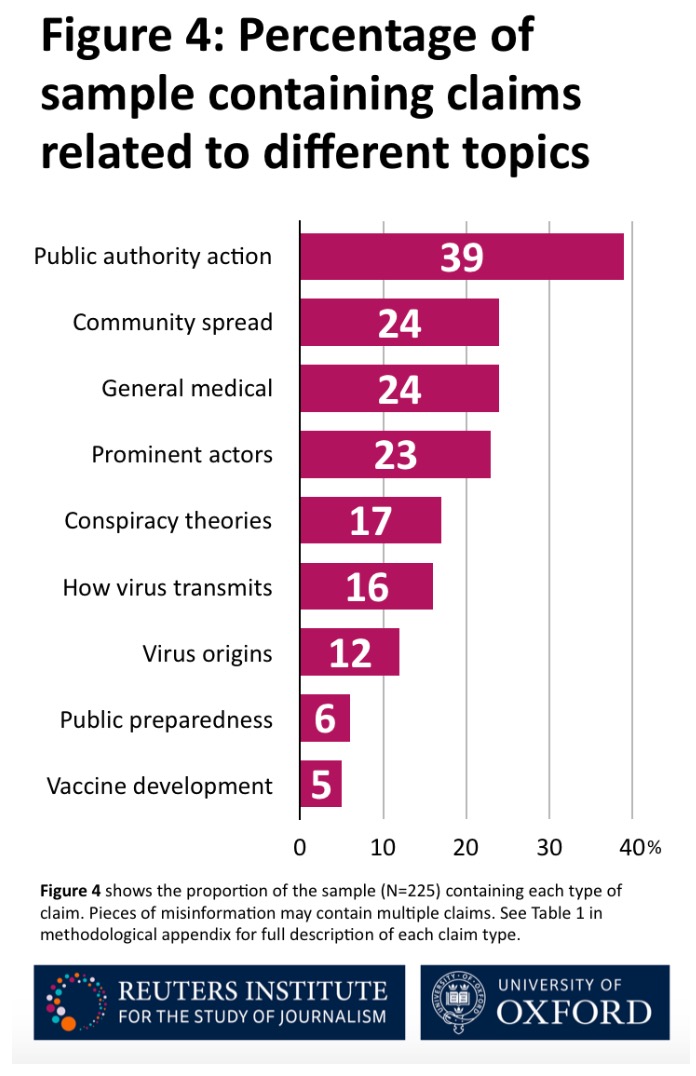New Analysis: “Types, Sources, and Claims of COVID-19 Misinformation”
From the Reuters Institute for the Study of Journalism:
In this factsheet we identify some of the main types, sources, and claims of COVID-19 misinformation seen so far. We analyse a sample of 225 pieces of misinformation rated false or misleading by fact-checkers and published in English between January and the end of March 2020, drawn from a collection of fact-checks maintained by First Draft.
We find that:
In terms of scale, independent fact-checkers have moved quickly to respond to the growing amount of misinformation around COVID-19; the number of English-language fact-checks rose more than 900% from January to March. (As fact-checkers have limited resources and cannot check all problematic content, the total volume of different kinds of coronavirus misinformation has almost certainly grown even faster.)
In terms of formats, most (59%) of the misinformation in our sample involves various forms of reconfiguration, where existing and often true information is spun, twisted, recontextualised, or reworked. Less misinformation (38%) was completely fabricated. Despite a great deal of recent concern, we find no examples of deep fakes in our sample. Instead, the manipulated content includes ‘cheap fakes’ produced using much simpler tools. The reconfigured misinformation accounts for 87% of social media interactions in the sample; the fabricated content, for 12%.
In terms of sources, top-down misinformation from politicians, celebrities, and other prominent public figures made up just 20% of the claims in our sample but accounted for 69% of total social media engagement. While the majority of misinformation on social media came from ordinary people, most of these posts seemed to generate far less engagement. However, a few instances of bottom-up misinformation garnered a large reach and our analysis is unable to capture spread in private groups and via messaging applications, likely platforms for significant amounts of bottom-up misinformation.
In terms of claims, misleading or false claims about the actions or policies of public authorities, including government and international bodies like the WHO or the UN, are the single largest category of claims identified, appearing in 39% of our sample.
In terms of responses, social media platforms have responded to a majority of the social media posts rated false by fact-checkers by removing them or attaching various warnings. There is significant variation from company to company, however. On Twitter, 59% of posts rated as false in our sample by fact-checkers remain up. On YouTube, 27% remain up, and on Facebook, 24% of false-rated content in our sample remains up without warning labels.
Direct to Full Text Factsheet
Direct to Full Text Factsheet (PDF)
13 pages.
Update (April 9, 2020)
Inside the Battle to Counteract the COVID-19 ‘infodemic’ (via WEF)
Filed under: News, Video Recordings
About Gary Price
Gary Price (gprice@gmail.com) is a librarian, writer, consultant, and frequent conference speaker based in the Washington D.C. metro area. He earned his MLIS degree from Wayne State University in Detroit. Price has won several awards including the SLA Innovations in Technology Award and Alumnus of the Year from the Wayne St. University Library and Information Science Program. From 2006-2009 he was Director of Online Information Services at Ask.com.




